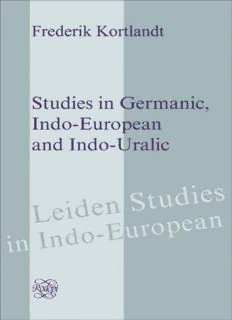
Studies in Germanic, Indo-European and Indo-Uralic PDF
Preview Studies in Germanic, Indo-European and Indo-Uralic
Frederik Kortlandt Studies in Germanic, Indo-European and Indo-U ralic Studies in Germanic, Indo-European and Indo-Uralic 17 LE!DENSTUDIESININDO-EUROPEAN Series edited by R. S.P. Beekes A. Lubotsky J.J.S. Weitenberg Studies in Germanic, Indo-European and Indo-Uralic Frederik Kortlandt Amsterdam- New York, NY 2010 The paper on which this book is printed meets the requirements of"ISO 9706: 1994, Information and documentation-Paper for documents Requirements for permanence" ISBN: 978-90-420-3135-7 E-Book ISBN: 978-90-420-3136-4 ©Editions Rodopi B.V., Amsterdam-New York, NY 2010 Printed in The Netherlands To the memoryofDirk Boutkan (1964-2002) CONTENTS PREFACE •••••••••••••••••••••••••••••••••••••••••••••••••••••••••••••••••••••••••••••••••••••••••••••••••••••••••••••••••••••••• xi INTRODUCTION The spread of the Indo-Europeans ............................................................................. 1 General linguistics and Indo-European reconstruction ......................................... 7 On Russenorsk ............................................................................................................ 21 The origin of the Goths ............................................................................................. 27 C.C. Uhlenbeck on Indo-European, Uralic and Caucasian ................................... 31 An outline of Proto-Indo-European ........................................................................ 37 Schleicher's fable ........................................................................................................ 47 INDO-EUROPEAN PHONOLOGY *H.o and *oH• .............................................................................................................. 51 Proto-Indo-European glottalic stops: The comparative evidence ........................ 53 Proto-Indo-European tones? .................................................................................... 67 An Indo-European substratum in Slavic? ................................................................ 73 INDO-EUROPEAN MORPHOSYNTAX 1st sg. middle *-H• ....................................................................................................... 81 Proto-Indo-European verbal syntax ......................................................................... 91 GREEK Greek numerals and Proto-Indo-European glottalic consonants ....................... 10 5 The Aeolic optative .................................................................................................... n1 The Greek 3rd pl endings ........................................................................................ 117 INDO-IRANIAN Glottalic consonants in Sindhi and Proto-Indo-European ................................. 121 Archaic ablaut patterns in the Vedic verb .............................................................. 125 Accent and ablaut in the Vedic verb ........................................................................ 131 The origin of the Indo-Iranian desiderative .......................................................... 139 viii Contents TOCHARIAN On the development of Proto-Indo-European fmal syllables in Tocharian ...... 143 The Tocharian word for 'woman' ............................................................................ 149 The fate of the sigmatic aorist in To char ian ........................................................... 151 A note on the Tocharian dual .................................................................................. 155 The To char ian imperfect ......................................................................................... 159 GERMANIC PHONOLOGY Vestjysk st0d, Icelandic preaspiration, and PIE glottalic stops ........................... 165 Proto-Germanic obstruents ....................................................................................1 69 Kluge's law and the rise of Proto-Germanic geminates ........................................ 175 Labials, velars and labiovelars in Germanic .......................................................... 179 Preaspiration or preglottalization? ......................................................................... 185 Germanic *e, and *e• .................................................................................................1 89 Proto-Germanic obstruents and the comparative method ................................. 193 English bottom, German Boden, and the chronology of sound shifts ................ 197 GERMANIC VERB CLASSES The Germanic first class of weak verbs .................................................................. 201 The Germanic third class of weak verbs ............................................................... 20 5 The Germanic seventh class of strong verbs ........................................................ 209 The Germanic fifth class of strong verbs ............................................................... 211 The Germanic sixth class of strong verbs .............................................................. 215 The Germanic fourth class of weak verbs .............................................................. 219 Old Norse taka, Gothic tekan, Greek rera:ywv ...................................................... 221 GERMANIC VERBAL INFLEXION The Germanic weak preterit ................................................................................... 227 The Proto-Germanic pluperfect ............................................................................. 235 GERMANIC NOMINAL INFLEXION a- The inflexion of the Indo-European stems in Germanic ................................ 239 The inflexion of the Germanic n-stems ................................................................. 343 GERMAN Old High German umlaut ...................................................................................... 2.47 The High German consonant shift. ....................................................................... 2.49 The origin of the Franconian tone accents ............................................................ 255 Contents ix ENGLISH The origin of the 0 ld English dialects ...................................................................2 59 How old is the English glottal stop? ...................................................................... 265 The origin of the Old English dialects revisited. .................................................. 26 9 Anglo-Frisian ............................................................................................................ 275 SCANDINAVIAN The Old Norse i-umlaut. .......................................................................................... 285 On breaking. ............................................................................................................. 289 Glottalization, preaspiration and gemination in English and Scandinavian .... 293 Early Runic consonants and the origin of the younger fu thark ......................... 29 9 Bjorketorp and Stentoften ....................................................................................... 305 The origin of the vestjysk s1:0d ................................................................................ 313 Vestjysk st0d again ................................................................................................... 317 ALBANIAN Proto-Indo-European *sin Albanian ..................................................................... 319 Proto-Indo-European *j in Albanian ..................................................................... 3 25 Reflexes oflndo-European consonants in Albanian ........................................... 329 ARMENIAN Armenian ewl 'oif ..................................................................................................... 333 BALTO-SLAVIC The Baltic word for 'in' ............................................................................................. 335 Alfs well that ends wel1 ............................................................................................ 337 Balto-Slavic accentuation revisited ......................................................................... 341 Lithuanian zinoti 'to know' ...................................................................................... 359 ITALO-CELTIC More on the chronology of Celtic sound changes ................................................ 361 ANATOLIAN Initiallaryngeals in Anatolian ................................................................................. 365 Hittite ammuk 'me' .................................................................................................. 369 Hittite hi-verbs and the Indo-European perfect ................................................... 373 Stative and middle in Hittite and Indo-European ................................................ 383 X Contents INDO-URALIC Eight Indo-Uralic verbs? .......................................................................................... 387 The Indo-Uralic verb ............................................................................................... 391 Nivkh as a Uralo-Siberian language ...................................................................... 405 Indo-Uralic consonant gradation .......................................................................... 409 Indo-Uralic and Altaic ............................................................................................. 415 Indo-Uralic and Altaic revisited ............................................................................. 419 APPENDIX A parasitological view of non-constructible sets ................................................. 429 The origin and nature of the linguistic parasite .................................................... 435 REFERENCES .............................................................................................................. 439 INDEX ......................................................................................................................... 493
Description: